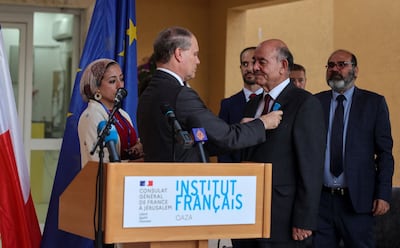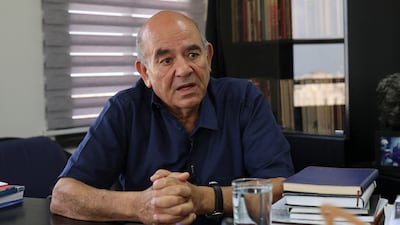Live updates: Follow the latest from Israel-Gaza
Raji Sourani’s smile faded quickly and his sense of muted rage turned to outright sorrow when he was asked about the fate of Gaza, the territory where he became known as "Mr ICC" for his work preparing cases documenting human rights violations.
For years, Mr Sourani has been building cases on the Israeli blockade of the enclave to be submitted to the International Criminal Court. The 70-year-old lawyer sent dozens of cases to The Hague after 2015 when the Palestinian Authority ratified the court's Rome Statute.
The veteran Palestinian human rights lawyer fled his bombed-out home in Gaza in October last year, and was in London this month delivering lectures on international law and Palestine. He also met the UK’s Attorney General Richard Hermer, whose legal advice to the government plays a direct role in shaping the UK's policy on Israel.
This should have been an uplifting trip: the UK is home to one of the largest pro-Palestinian movements outside the Middle East, and the Labour government has said it will be guided by international law in its approach to the conflict. Mr Hermer is known to have criticised Israel in the past.
Yet it is those meetings with UK officials, as well as countless other western politicians over decades, that have soured him. He sees no chance of the UK adopting a stronger position on Israel. He says the UK is “not really going by the rule of law, as they claim".
“How many children and women in Gaza do they want to die, how much more destruction and displacement do they want to have, until they realise what’s going on there is evil?" he told The National.
He was busy preparing a memorial for the International Court of Justice at The Hague – due this month – where he has contributed to South Africa’s case charging Israel with genocide. The court ruled there was a “risk of plausible genocide” in Gaza in February this year, and outlined measures to be followed to prevent this from happening.
Mr Sourani's report for the ICJ will show that Israel has ignored the court's directives until now. “It’s about the war crimes Israel committed during this course – none of the provisional decisions have been respected,” he said.
But he also lays blame on the international community for failing to restrict Israel’s military campaign in Gaza, as required by the ICJ. “It shows third-party responsibility is failing. None of them are acting seriously to hold Israel accountable,” he said.

Israel’s war crimes against the Palestinian people are “the most well-documented on earth”, he said. “I can assure you, there is not one single incident that is not well-documented. That’s how we make it. We don’t forget or forgive,” he said.
Human rights organisations including the Palestinian Centre for Human Rights in Gaza, which he leads, and Al Haq in the West Bank, are working “collectively and together” alongside international legal groups to bring their cases forward. Mr Sourani’s own 45-person team in southern and northern Gaza is diligently documenting the war, and building a case for war crimes and genocide committed by the Israeli army. “They are a huge, huge resource of information and files.”
There were also 20 staff offering logistical support outside Gaza and briefing The Hague’s jurists. “We have our lawyers, our workers on the ground, they are day-by-day documenting what’s going on.”
Institutions in The Hague such as the International Court of Justice had established the illegality of Israel’s occupation of the Palestinian territories in July. The International Criminal Court’s prosecutor Karim Khan has made a request for arrest warrants for the Israeli Prime Minister Benjamin Netanyahu and Defence Minister Yoav Gallant.
The evidence is extensive, the methods well-established. It is the absence of political will from Israel’s allies that obstructs the road to justice. “They ask you to be a good victim, you have to suffer calmly,” he said.
Top of Mr Sourani’s list of examples was the UK’s abstention on the United Nations General Assembly vote in September, which sought an end to Israel's occupation of the Palestinian territories, as directed by the ICJ. “Abstained on what? When a resolution has been taken by the most important court on earth about the illegality of the occupation. You can’t deal with justice selectively or partially,” he said. “Court decisions: either you take it or leave it. That’s the ABC of respecting the rule of law.”
The UK has yet to take steps to “fix” the damage caused by the former Conservative government’s challenge to the ICC over the prosecutor’s request for arrest warrants. “It was an obvious attempt for the obstruction of justice,” he said.
Though the Labour government dropped the challenge when it came to power, “the damage was already done”, he says. “I don’t understand why they did it and how they can fix the damage that was already done. It’s not enough that you take out the injunction.”
The UK has also faced pressure to ban the sale of components to the global F-35 fighter jet programme. The UK says this would require it to pull out of the contract entirely and could have an impact on Western support for Ukraine, a claim human rights organisations dispute.
Mr Sourani dismissed the debate, pointing to Gaza’s rising death toll: more than 40,000 dead – 15,000 of them children, 12,000 women – and tens of thousands more expected to die from disease and malnutrition. “You are still discussing whether the F-35 components should go or not?” he said.
One corrective move, he suggests, would be to revoke the special mission immunity status the UK gives to visiting politicians, which shields them from arrest by British police. The regulation, Mr Sourani points out, limits the universal jurisdiction of UK courts, which allows foreign nationals to be prosecuted for war crimes committed overseas.
In his early career, Mr Sourani was one of the promising names in a new generation of Palestinian Liberation Organisation lawyers. Using tools afforded by the law and its international institutions, his was a generation poised to steer Palestine on the path to recognition and justice.
“We are not the alternative to political parties. We are romantic revolutionaries and we are investing our best in it,” he said. “International law is not something the Palestinians invented. We do that because we believe in the rule of law.”
He was imprisoned six times by the Israelis in the 1980s, and named an Amnesty International Prisoner of Conscience in 1988. “They say we are terrorists in suits, that we are doing lawfare, we are the agents of terrorist organisations,” he said.
Today, he lives in Cairo with his family as refugees from Gaza, displaced once again. He has lost two “young, fantastic” women lawyers who worked with him at the Centre. Nour Naser Abu Al Nour was killed in an Israeli attack on their centre in February, and Dana Yaghi died in an attack two days later, he said.
The case he is building at The Hague will represent victims like Ms Abu Al Nour. It also includes Hind Rajab, the six-year old girl whose call to emergency responders from a bombed-out car before she was herself killed was widely circulated online.
The ambulance that came for Hind was also attacked, killing the paramedics inside. Israel denies it attacked the car containing Hind’s family and the ambulance. Independent experts from the UN Human Rights Council say the killing could amount to a war crime.
Yet Israel is also well-resourced, with data gathered from the war and its vast surveillance operations in Gaza. There is always the risk that it could find a loophole or get off on a minor technicality in the law.
Mr Sourani is dismissive again. “The Israelis have no case to answer in law. They can be really powerful in military, in intelligence, in bombing, in killing. But they have no legs to stand on,” he said. “Look at how they stood at the ICJ? Dazed, confused, a lot of water in their mouth."
He is adamant that they – the Palestinians – will succeed in their quest for justice. “We do have moral legal superiority. We have the facts, we have the standards, and we know them all. In this area they don’t mess with us,” he said.
But without the political will to sustain them, Gaza risked being the final nail in the coffin for the Western world’s professed commitment to the rule of law. “If others want the rule of the jungle, that’s their problem. But they should stop talking about rule of law, democracy, human rights. Gaza is a test case: is it the graveyard of international law?”


